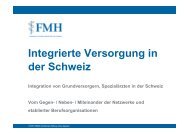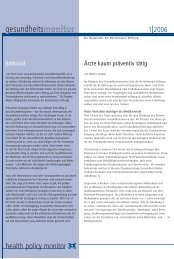The 2nd HPD report - Health Policy Monitor
The 2nd HPD report - Health Policy Monitor
The 2nd HPD report - Health Policy Monitor
- TAGS
- health
- policy
- monitor
- www.hpm.org
You also want an ePaper? Increase the reach of your titles
YUMPU automatically turns print PDFs into web optimized ePapers that Google loves.
Public Visibility<br />
Impact<br />
Transferability<br />
Post code<br />
prescribing<br />
Guidelines<br />
for primary<br />
care trusts<br />
England and Wales: <strong>Health</strong> technology assessment and the<br />
National Institute for Clinical Excellence<br />
In 2003, the WHO Regional Office for Europe reviewed the NICE<br />
Technical Appraisal Programme. It concluded that, “NICE (the<br />
National Institute for Chlinical Excellence) has developed a welldeserved<br />
reputation for innovation and methodological developments<br />
that represent an important model for technology appraisals<br />
internationally.” On the other hand, the WHO experts<br />
criticized the close relationship between NICE and the pharmaceutical<br />
industry. <strong>The</strong>y recommend excluding physicians employed<br />
by pharmaceutical companies from assessment boards<br />
and involving them by way of separate consultation procedures<br />
instead.<br />
Idea<br />
Pilot<br />
<strong>Policy</strong> Paper<br />
Legislation<br />
Adoption<br />
Evaluation<br />
Change<br />
NICE was established in 1999 as an official health authority<br />
for England and Wales. It may be viewed as a response to variations<br />
in the quality of care offered by the National <strong>Health</strong> Service<br />
(NHS) and to rising costs caused by the introduction of new<br />
technologies and medicines. Its main role is to produce and disseminate<br />
clinical guidelines based on evidence of clinical and cost<br />
effectiveness.<br />
<strong>The</strong> overall strategy was set out in the NHS Plan, which established<br />
National Service Frameworks and the Commission for<br />
<strong>Health</strong> Care Inspection as important national initiatives alongside<br />
NICE.<br />
Since 2001, NHS organizations must follow NICE recommendations<br />
that the secretary of state for health has approved.<br />
<strong>The</strong> main organizations expected to respond to NICE guidelines<br />
are primary care trusts, which have the responsibility for deciding<br />
whether particular treatments will be funded through the local<br />
NHS.<br />
Of the 62 technologies assessed by NICE in the first four years<br />
of its operations, the majority have dealt with pharmaceuticals. To<br />
54






